外研版(2019)必修 第一册Unit 5 Into the wild Using language 课件(共38张PPT,内嵌音频)
文档属性
| 名称 | 外研版(2019)必修 第一册Unit 5 Into the wild Using language 课件(共38张PPT,内嵌音频) |
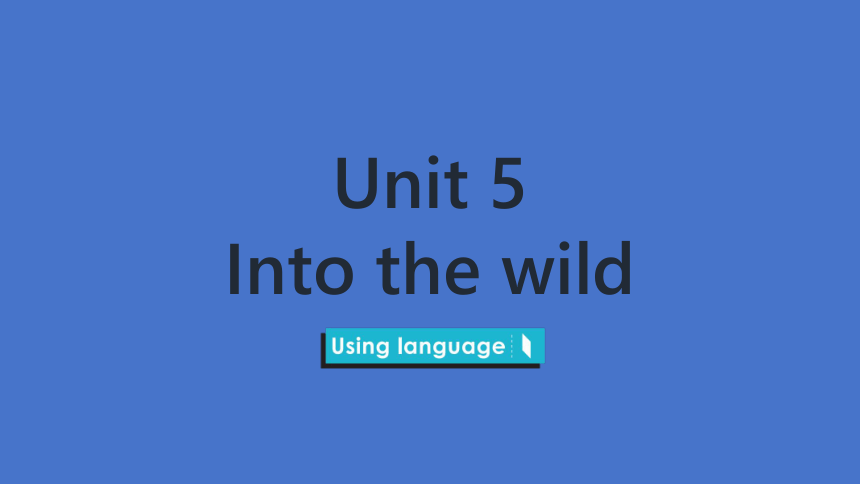
|
|
| 格式 | pptx | ||
| 文件大小 | 13.6MB | ||
| 资源类型 | 教案 | ||
| 版本资源 | 外研版(2019) | ||
| 科目 | 英语 | ||
| 更新时间 | 2024-07-01 00:00:00 | ||
图片预览

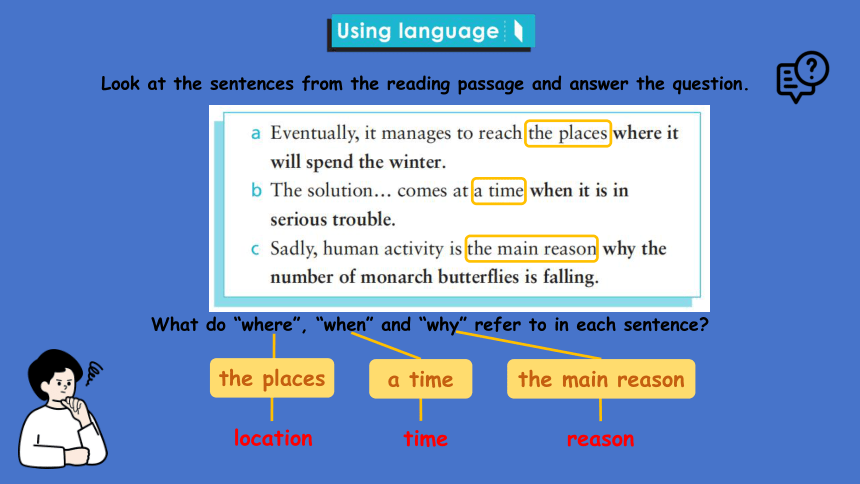
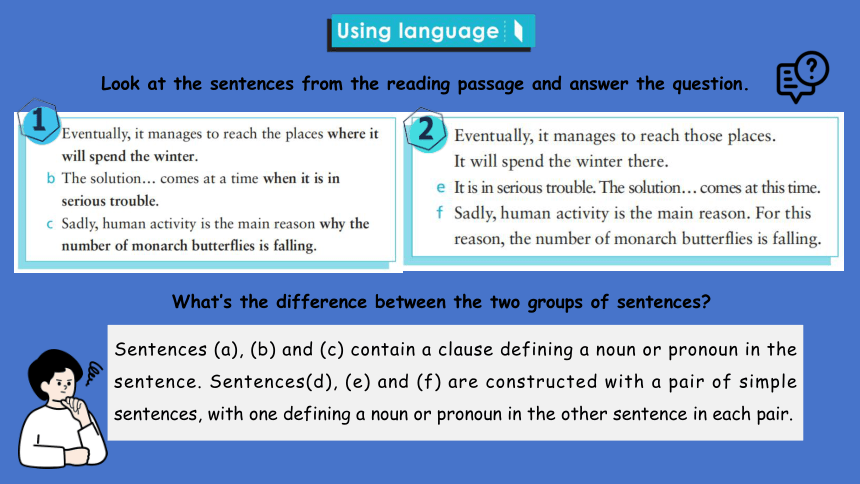
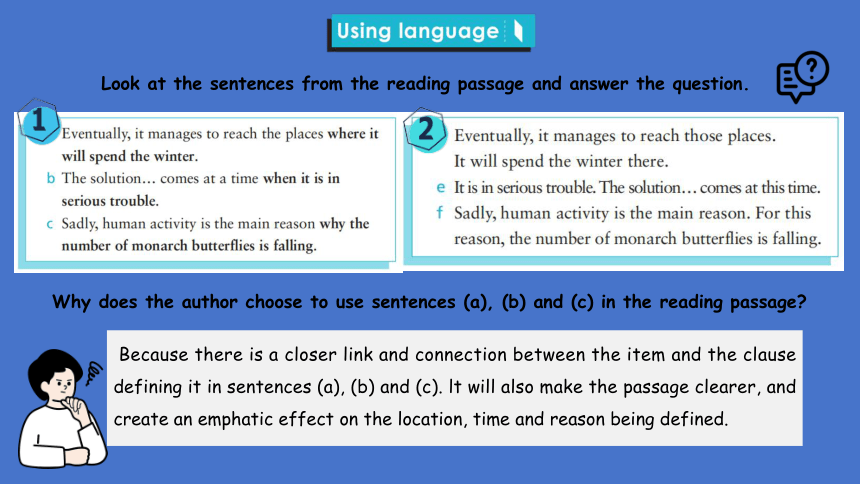
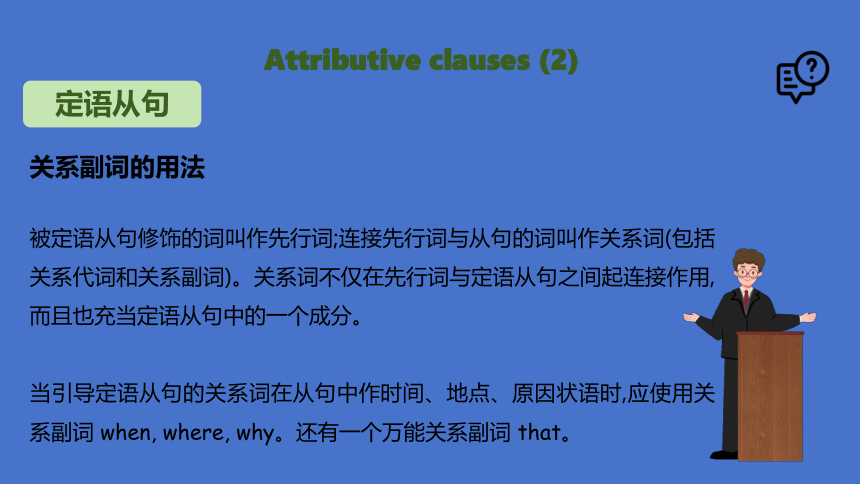
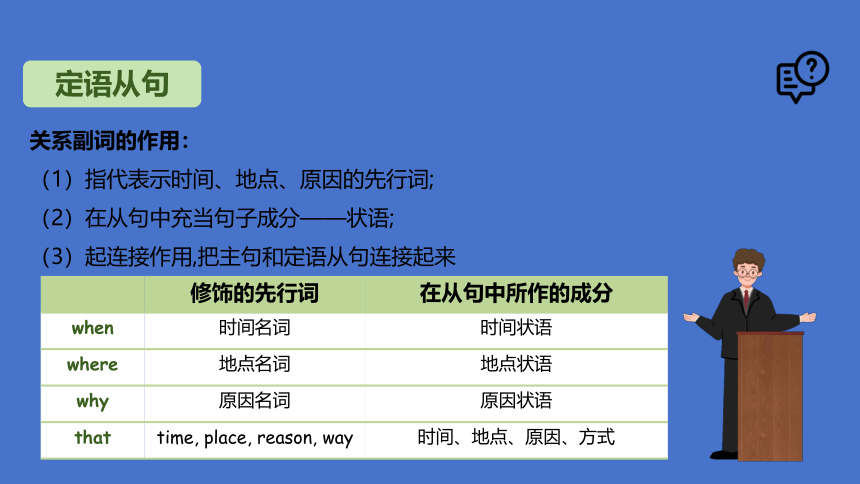
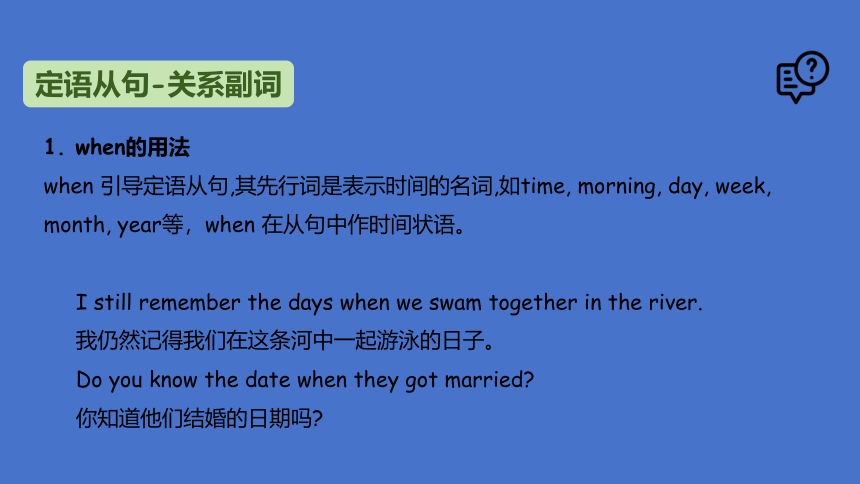
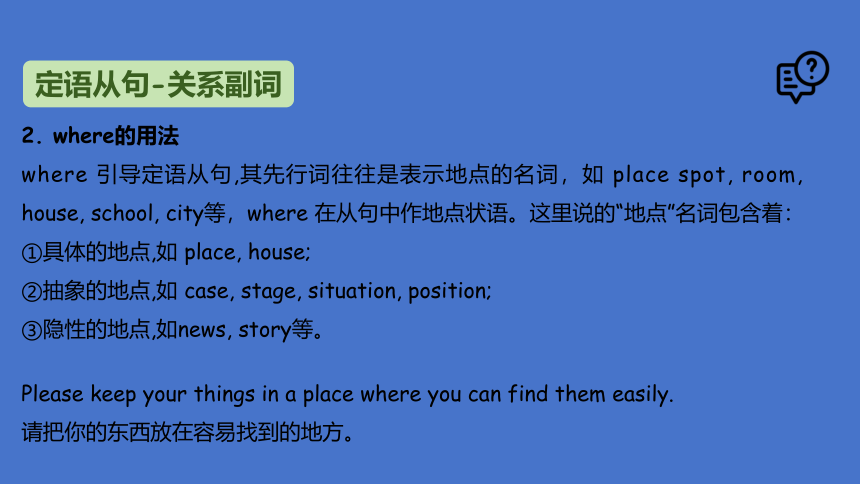
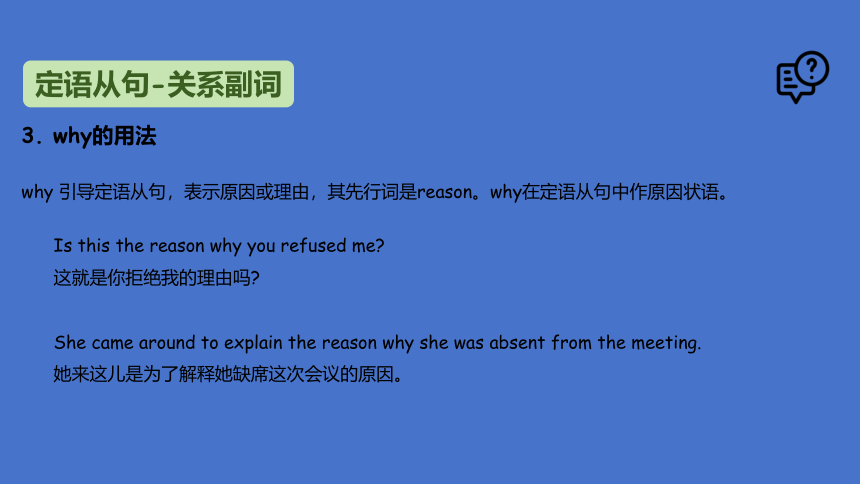
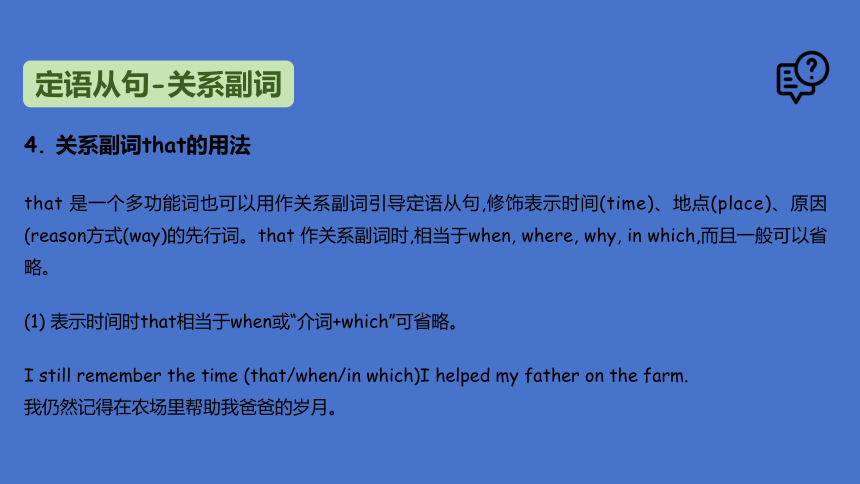
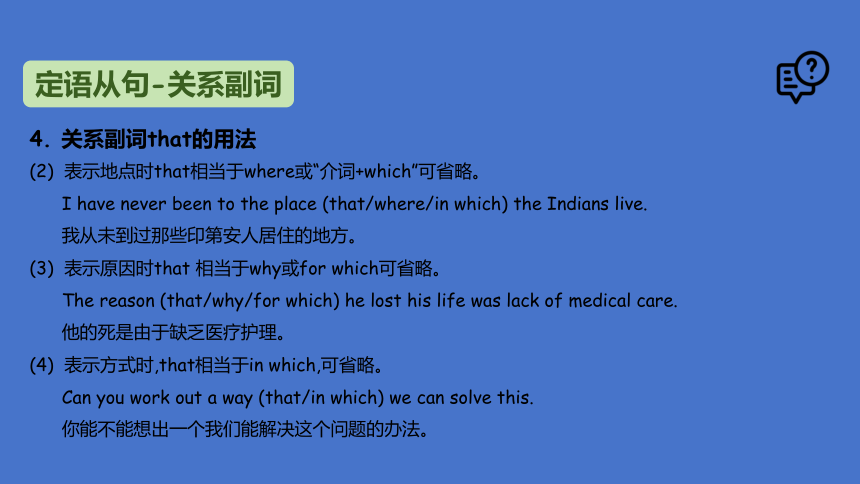

文档简介
(共38张PPT)
Unit 5
Into the wild
Look at the sentences from the reading passage and answer the question.
What do “where”, “when” and “why” refer to in each sentence
the places
a time
the main reason
location
time
reason
Look at the sentences from the reading passage and answer the question.
What’s the difference between the two groups of sentences
Sentences (a), (b) and (c) contain a clause defining a noun or pronoun in the sentence. Sentences(d), (e) and (f) are constructed with a pair of simple sentences, with one defining a noun or pronoun in the other sentence in each pair.
Look at the sentences from the reading passage and answer the question.
Why does the author choose to use sentences (a), (b) and (c) in the reading passage
Because there is a closer link and connection between the item and the clause defining it in sentences (a), (b) and (c). lt will also make the passage clearer, and create an emphatic effect on the location, time and reason being defined.
Attributive clauses (2)
定语从句
关系副词的用法
被定语从句修饰的词叫作先行词;连接先行词与从句的词叫作关系词(包括关系代词和关系副词)。关系词不仅在先行词与定语从句之间起连接作用,而且也充当定语从句中的一个成分。
当引导定语从句的关系词在从句中作时间、地点、原因状语时,应使用关系副词 when, where, why。还有一个万能关系副词 that。
关系副词的作用:
(1)指代表示时间、地点、原因的先行词;
(2)在从句中充当句子成分——状语;
(3)起连接作用,把主句和定语从句连接起来
定语从句
修饰的先行词 在从句中所作的成分
when 时间名词 时间状语
where 地点名词 地点状语
why 原因名词 原因状语
that time, place, reason, way 时间、地点、原因、方式
1. when的用法
when 引导定语从句,其先行词是表示时间的名词,如time, morning, day, week, month, year等,when 在从句中作时间状语。
I still remember the days when we swam together in the river.
我仍然记得我们在这条河中一起游泳的日子。
Do you know the date when they got married
你知道他们结婚的日期吗
定语从句-关系副词
2. where的用法
where 引导定语从句,其先行词往往是表示地点的名词,如 place spot, room, house, school, city等,where 在从句中作地点状语。这里说的“地点”名词包含着:
①具体的地点,如 place, house;
②抽象的地点,如 case, stage, situation, position;
③隐性的地点,如news, story等。
Please keep your things in a place where you can find them easily.
请把你的东西放在容易找到的地方。
定语从句-关系副词
3. why的用法
why 引导定语从句,表示原因或理由,其先行词是reason。why在定语从句中作原因状语。
Is this the reason why you refused me
这就是你拒绝我的理由吗
She came around to explain the reason why she was absent from the meeting.
她来这儿是为了解释她缺席这次会议的原因。
定语从句-关系副词
4. 关系副词that的用法
that 是一个多功能词也可以用作关系副词引导定语从句,修饰表示时间(time)、地点(place)、原因(reason方式(way)的先行词。that 作关系副词时,相当于when, where, why, in which,而且一般可以省略。
(1) 表示时间时that相当于when或“介词+which”可省略。
I still remember the time (that/when/in which)I helped my father on the farm.
我仍然记得在农场里帮助我爸爸的岁月。
定语从句-关系副词
4. 关系副词that的用法
(2) 表示地点时that相当于where或“介词+which”可省略。
I have never been to the place (that/where/in which) the Indians live.
我从未到过那些印第安人居住的地方。
(3) 表示原因时that 相当于why或for which可省略。
The reason (that/why/for which) he lost his life was lack of medical care.
他的死是由于缺乏医疗护理。
(4) 表示方式时,that相当于in which,可省略。
Can you work out a way (that/in which) we can solve this.
你能不能想出一个我们能解决这个问题的办法。
定语从句-关系副词
关系代词与关系副词的选用:
1. 若从句的谓语动词是及物动词,后面若无宾语,用关系代动词词;是不及物动词则用关系副词。
2. 若关系词在从句中作主语或宾语,则用关系代词;若作状语,则用关系副词。
(1)This is the factory (that/which) I visited last year.
(visit是及物动词,关系代词在从句中作宾语)
这是我去年参观过的那家工厂。
This is the factory where he used to work.
(work是不及物动词,关系副词在从句中作地点状语)
这是他以前工作过的那家工厂。
定语从句-关系副词
关系代词与关系副词的选用:
1. 若从句的谓语动词是及物动词,后面若无宾语,用关系代动词词;是不及物动词则用关系副词。
2. 若关系词在从句中作主语或宾语,则用关系代词;若作状语,则用关系副词。
(1)This is the factory (that/which) I visited last year.
(visit是及物动词,关系代词在从句中作宾语)
这是我去年参观过的那家工厂。
This is the factory where he used to work.
(work是不及物动词,关系副词在从句中作地点状语)
这是他以前工作过的那家工厂。
定语从句-关系副词
(3)Is this the reason (that/which ) he explained for being late (关系代词在从句中作宾语)
这就是他解释的迟到的原因吗
Is this the reason why he was late for class (关系副词在从句中作原因状语)
这就是他上课迟到的原因吗
(4)This is the house where my grandfather lived.(关系副词在从句中作地点状语)
这是我祖父住过的房子。
This is the house (that/which) my grandfather lived in.
定语从句-关系副词
限制性定语从句用来修饰和限制先行词,与主句的关系非常密切,不用逗号和主句隔开。它说明先行词的性质.身份、特征等状况;如果去掉,就会影响句子意思的完整。
The doctor is a person who looks after people's health.
医生就是负责人们健康的人。
This is the school where Tom studied.
这就是汤姆学习过的学校。
限制性定语从句与非限制性定语从句
(1) 非限制性定语从句的特点
非限制性定语从句与主句的关系不像限制性定语从句那样紧密,只是对先行词作些附加说明,即使去掉,主句的意思依然清楚完整。它与主句之间通常用逗号分开。翻译时常常不译作定语,而是译成与主句并列的句子,或者状语从句。
Last night I saw a very good film, which was about the Second World War.
昨晚我看了一部非常好的电影,是关于第二次世界大战的。
限制性定语从句与非限制性定语从句
非限制性定语从句,是对先行词没有特别限制的定语从句。除了that 和why 不能引导之外,所有其他关系词如who, whom, which, whose, as, when, where等均可引导。
(2) 非限制性定语从句的使用情况:
① 当关系代词指代整个主句内容时,用非限制性定语从句(用which或as引导)。
The boy was badly ill, which worried his parents very much.
那个男孩病得很厉害,这让他的父母很担心。
② 当先行词指的是世界上独一无二的事物或专有名词时用非限制性定语从句。
The moon, which is about 384,400 kilometres away from the earth, creates many beautiful stories.
离地球约384400 千米远的月球,引发了很多美好的故事。
限制性定语从句与非限制性定语从句
(2) 非限制性定语从句的使用情况:
④当引导定语从句的关系代词前有some/many/few/a few/little/a little/none /much /most/half of等时,多用非限制性定语从句。
I know three foreign teachers, two of whom are from Canada.
我认识三名外国老师,其中两名来自加拿大。
限制性定语从句与非限制性定语从句
③先行词指某人的亲属,具有唯一性和确认性时,如son, daughter, father, mother, wife等,用非限制性定语从句。
My father, who is an excellent violinist, is leaving for Canada for performances.
我爸爸是一名出色的小提琴手。他正准备去加拿大演出。
区别
限制性定语从句 非限制性定语从句
与整个句子的关系 密切; 若去掉会影响句子意义的完整性 松散;
只是补充说明,
去掉后不影响句子意义的表达
逗号的运用 不用逗号 一般用逗号
that和why 可用that或why 一般用that或why
which和who在从句中作宾语时 可省略 时间、地点、原因、方式
whom在从句中作宾语时 可省略 不可省略
可否修饰整个句子 不可 可修饰整个句子,用逗号隔开,由which或as引导
翻译时的区别 常译作定语 常译为并列句或按状语从句翻译
as与which引导的非限制性定语从句的区别
(1) as引导的从句表示说话人的看法、态度解释或评论。
引导定语从句时,as仍具有“正如,像,由 可知”等意思,翻译时有时可不必译出。as引导的定语从句常含有这些动词:see, know, hear, watch, remember, say, tell, show, expect, guess等。这类动词与as连用几乎成了一种固定搭配。as引导的此类从句可以置于句首、句中或句尾。
There is a net bar around here, as I remember.
我记得这儿附近有一家网吧。
关系代词as与which引导的非限制性定语从句,其先行词都可以是整个主句,指代整个主句的意思。但as和which具有不同的词义句法和用法。
(2) which引导的从句对主所叙述的事情进行补充说明表明事物的状态或结果。
which此时指前面主所提句与主句之间常含有并列因果关系。注意它引导的从句不像as那样位置灵活它只能位于主句的后面。
He found a solution to this mystery, which (= and it) made us all excited.
他找到了此谜的一个解决方案,这让我们大家都很兴奋。
(3) 在从句中作定语或介词的宾语时要用which。
Jenny might come, in which case I'll ask her.
珍妮可能会来,要是那样的话我就去问她。
(4) 当从句的谓语动词是否定形式或含着一个复合宾语时一般用which而不用as。
He pretended not to know me, which I didn't understand.
他假装不认识我,这是我搞不明白的。
as与which引导的非限制性定语从句的区别
Exercise
1. Unfortunately, the plane lost track of the airport and ________ then crashed. The survived had witnessed the scene.
2. In order to enrich your vocabulary, you should learn some English idioms, ________ are" rain cats and dogs", "hold your horses" , "kill two birds with one
stone” and soon.
3. A photographer ________ must have an amazing imagination.
4. We'll organize a series of activities, ________ are inspiring to children's awareness art and enable them to form good qualities.
who/that
which
who/that
which
Exercise
5. I encountered a photographer on the path, ________ was so concentrated on observing the beautiful scenes that he ignored me.
6. It is unusual to spend 70 per cent of the average ________ income on the houses you don't need.
7. On average, 15 per cent of the criminals ________ are set free tend to commit crimes again.
8. After the crash, 80 per cent of the passengers ________ recovered from the shock somehow suffered a slow reaction.
who
which/that
who/that
who/that
Vocabulary
1. accommodation
accommodate v.提供住宿(或膳宿、座位等;容纳
provide accommodations for 为……提供膳宿
accommodate/adapt (oneself) to 适应;使……适应……
练习:
Five hundred people in all will come here. Is the hotel big enough __________________ (accommodate) them
to accommodation
Vocabulary
2. source
an energy source 能量来源
a source of power 动力来源
a source of enjoyment/strength 快乐/力量的源泉
the source ofthe Yellow River 黄河的源头
练习:Wind is now the world's fastest growing _______________ (动力来源).
source of power
Vocabulary
2. source
an energy source 能量来源
a source of power 动力来源
a source of enjoyment/strength 快乐/力量的源泉
the source ofthe Yellow River 黄河的源头
练习:Wind is now the world's fastest growing _______________ (动力来源).
source of power
Vocabulary
3. found
to be founded on sth. 建立在某事物的基础上
练习:
Peking University _____________ (found) in 1898.
was founded
Read the passage and underline the words that where, when and why refer to.
People were excited – the zoo is the only place in the country where it is possible to see pandas. In fact, the last time there were pandas in the Netherlands was in 1987. And of course, the main reason why they were so excited is that pandas are just so cute!
zIn April 2017, two giant pandas from China arrived at a zoo in the Netherlands. There, they were welcomed to the Chinese-style compound(场地) where they were to live. On 30 May, after the preparations were complete, the day finally came when the pandas met their fans for the first time.
Look at the pictures and complete the idioms with animal names.
5
1
2
4
3
bee
birds
mice
horses
dogs
cats
1. It’s raining heavily. —
2. someone who is always working or busy doing something —
3. You should wait and be patient when you’re rushing into something. —
4. People do what they want and have fun when someone in authority
is absent. —
5. solve two problems with one action —
Can you guess the meaning
It’s raining cats and dogs.
as busy as a bee
hold your horses
When the cat’s away, the mice will play.
kill two birds with one stone
Look at the pictures and complete the idioms with animal names.
English idioms are a way of adding colour to the language. For example, instead of saying “It’s raining heavily”, you could say “1______________________”. Another reason to use idioms is that they are concise. For example, to describe someone who is always working or busy doing something, we can say they are 2 ______________. If they’re rushing into something and should wait and be patient, you could say “3______________”. Learning idioms can be fun, especially when we compare them to Chinese equivalents. Take, for example, “4___________________________________” (people do what they want and have fun when someone in authority is absent) and “5_______________________” (solve two problems with one action) – are there corresponding idioms in Chinese
It’s raining cats and dogs.
as busy as a bee
hold your horses
When the cat’s away, the mice will play.
kill two birds with one stone
Work in pairs.
Find more animal idioms. Choose an idiom and describe a situation with it.
Listen to the TV debate and choose the correct topic.
1. Can zoo animals survive in the wild
2. Can zoos offer animals their natural environment
3. Should we keep wild animals in the zoo
4. Should we educate people more about animals
Work in pairs.
Hold a debate on whether we should keep animals as pets.
student A
Activity 9
One of your friends has been avoiding you all week. He / She doesn’t talk to you and refuses to text or phone you back.
Ask Student B for suggestions and give comments on them.
Activity 9
student B
Student A has a problem and needs your help. Find out what the problem is and give him / her some suggestions as to how to solve it.
Exercise
When he stood in front of the house ____________ he grew up as a child, he saw a lady standing in the entrance.
Only humans and chimps , she said , had a system of communication _____________ they deliberately sent a message to another group member.
Self-driving is an area _____________ China and the rest of the world are on the same starting line.
where
where
where
Exercise
As the smallest child of his family, Alex is always longing for the time __________ he should be able to be independent.
The reason __________ someone is triggered by something and others are not is often due to one's personal history and psychological traits.
Many of us love July because it's the month ____________ nature's berries and stone fruits are in abundance.
when
why
when
Exercise
I arrived early at Byron Bay __________ we were supposed to meet.
We have entered into an age __________ dreams have the best chance of coming true.
Their child is at the stage __________ she can say individual words but not full sentences.
There was a time ___________ people may have felt awkward about asking for a table for one but those days are over.
where
when
where
when
Review the points from the lesson and complete the exercises.
Work in pairs. Think of another topic that is related to animals and hold a debate.
Homework
Unit 5
Into the wild
Look at the sentences from the reading passage and answer the question.
What do “where”, “when” and “why” refer to in each sentence
the places
a time
the main reason
location
time
reason
Look at the sentences from the reading passage and answer the question.
What’s the difference between the two groups of sentences
Sentences (a), (b) and (c) contain a clause defining a noun or pronoun in the sentence. Sentences(d), (e) and (f) are constructed with a pair of simple sentences, with one defining a noun or pronoun in the other sentence in each pair.
Look at the sentences from the reading passage and answer the question.
Why does the author choose to use sentences (a), (b) and (c) in the reading passage
Because there is a closer link and connection between the item and the clause defining it in sentences (a), (b) and (c). lt will also make the passage clearer, and create an emphatic effect on the location, time and reason being defined.
Attributive clauses (2)
定语从句
关系副词的用法
被定语从句修饰的词叫作先行词;连接先行词与从句的词叫作关系词(包括关系代词和关系副词)。关系词不仅在先行词与定语从句之间起连接作用,而且也充当定语从句中的一个成分。
当引导定语从句的关系词在从句中作时间、地点、原因状语时,应使用关系副词 when, where, why。还有一个万能关系副词 that。
关系副词的作用:
(1)指代表示时间、地点、原因的先行词;
(2)在从句中充当句子成分——状语;
(3)起连接作用,把主句和定语从句连接起来
定语从句
修饰的先行词 在从句中所作的成分
when 时间名词 时间状语
where 地点名词 地点状语
why 原因名词 原因状语
that time, place, reason, way 时间、地点、原因、方式
1. when的用法
when 引导定语从句,其先行词是表示时间的名词,如time, morning, day, week, month, year等,when 在从句中作时间状语。
I still remember the days when we swam together in the river.
我仍然记得我们在这条河中一起游泳的日子。
Do you know the date when they got married
你知道他们结婚的日期吗
定语从句-关系副词
2. where的用法
where 引导定语从句,其先行词往往是表示地点的名词,如 place spot, room, house, school, city等,where 在从句中作地点状语。这里说的“地点”名词包含着:
①具体的地点,如 place, house;
②抽象的地点,如 case, stage, situation, position;
③隐性的地点,如news, story等。
Please keep your things in a place where you can find them easily.
请把你的东西放在容易找到的地方。
定语从句-关系副词
3. why的用法
why 引导定语从句,表示原因或理由,其先行词是reason。why在定语从句中作原因状语。
Is this the reason why you refused me
这就是你拒绝我的理由吗
She came around to explain the reason why she was absent from the meeting.
她来这儿是为了解释她缺席这次会议的原因。
定语从句-关系副词
4. 关系副词that的用法
that 是一个多功能词也可以用作关系副词引导定语从句,修饰表示时间(time)、地点(place)、原因(reason方式(way)的先行词。that 作关系副词时,相当于when, where, why, in which,而且一般可以省略。
(1) 表示时间时that相当于when或“介词+which”可省略。
I still remember the time (that/when/in which)I helped my father on the farm.
我仍然记得在农场里帮助我爸爸的岁月。
定语从句-关系副词
4. 关系副词that的用法
(2) 表示地点时that相当于where或“介词+which”可省略。
I have never been to the place (that/where/in which) the Indians live.
我从未到过那些印第安人居住的地方。
(3) 表示原因时that 相当于why或for which可省略。
The reason (that/why/for which) he lost his life was lack of medical care.
他的死是由于缺乏医疗护理。
(4) 表示方式时,that相当于in which,可省略。
Can you work out a way (that/in which) we can solve this.
你能不能想出一个我们能解决这个问题的办法。
定语从句-关系副词
关系代词与关系副词的选用:
1. 若从句的谓语动词是及物动词,后面若无宾语,用关系代动词词;是不及物动词则用关系副词。
2. 若关系词在从句中作主语或宾语,则用关系代词;若作状语,则用关系副词。
(1)This is the factory (that/which) I visited last year.
(visit是及物动词,关系代词在从句中作宾语)
这是我去年参观过的那家工厂。
This is the factory where he used to work.
(work是不及物动词,关系副词在从句中作地点状语)
这是他以前工作过的那家工厂。
定语从句-关系副词
关系代词与关系副词的选用:
1. 若从句的谓语动词是及物动词,后面若无宾语,用关系代动词词;是不及物动词则用关系副词。
2. 若关系词在从句中作主语或宾语,则用关系代词;若作状语,则用关系副词。
(1)This is the factory (that/which) I visited last year.
(visit是及物动词,关系代词在从句中作宾语)
这是我去年参观过的那家工厂。
This is the factory where he used to work.
(work是不及物动词,关系副词在从句中作地点状语)
这是他以前工作过的那家工厂。
定语从句-关系副词
(3)Is this the reason (that/which ) he explained for being late (关系代词在从句中作宾语)
这就是他解释的迟到的原因吗
Is this the reason why he was late for class (关系副词在从句中作原因状语)
这就是他上课迟到的原因吗
(4)This is the house where my grandfather lived.(关系副词在从句中作地点状语)
这是我祖父住过的房子。
This is the house (that/which) my grandfather lived in.
定语从句-关系副词
限制性定语从句用来修饰和限制先行词,与主句的关系非常密切,不用逗号和主句隔开。它说明先行词的性质.身份、特征等状况;如果去掉,就会影响句子意思的完整。
The doctor is a person who looks after people's health.
医生就是负责人们健康的人。
This is the school where Tom studied.
这就是汤姆学习过的学校。
限制性定语从句与非限制性定语从句
(1) 非限制性定语从句的特点
非限制性定语从句与主句的关系不像限制性定语从句那样紧密,只是对先行词作些附加说明,即使去掉,主句的意思依然清楚完整。它与主句之间通常用逗号分开。翻译时常常不译作定语,而是译成与主句并列的句子,或者状语从句。
Last night I saw a very good film, which was about the Second World War.
昨晚我看了一部非常好的电影,是关于第二次世界大战的。
限制性定语从句与非限制性定语从句
非限制性定语从句,是对先行词没有特别限制的定语从句。除了that 和why 不能引导之外,所有其他关系词如who, whom, which, whose, as, when, where等均可引导。
(2) 非限制性定语从句的使用情况:
① 当关系代词指代整个主句内容时,用非限制性定语从句(用which或as引导)。
The boy was badly ill, which worried his parents very much.
那个男孩病得很厉害,这让他的父母很担心。
② 当先行词指的是世界上独一无二的事物或专有名词时用非限制性定语从句。
The moon, which is about 384,400 kilometres away from the earth, creates many beautiful stories.
离地球约384400 千米远的月球,引发了很多美好的故事。
限制性定语从句与非限制性定语从句
(2) 非限制性定语从句的使用情况:
④当引导定语从句的关系代词前有some/many/few/a few/little/a little/none /much /most/half of等时,多用非限制性定语从句。
I know three foreign teachers, two of whom are from Canada.
我认识三名外国老师,其中两名来自加拿大。
限制性定语从句与非限制性定语从句
③先行词指某人的亲属,具有唯一性和确认性时,如son, daughter, father, mother, wife等,用非限制性定语从句。
My father, who is an excellent violinist, is leaving for Canada for performances.
我爸爸是一名出色的小提琴手。他正准备去加拿大演出。
区别
限制性定语从句 非限制性定语从句
与整个句子的关系 密切; 若去掉会影响句子意义的完整性 松散;
只是补充说明,
去掉后不影响句子意义的表达
逗号的运用 不用逗号 一般用逗号
that和why 可用that或why 一般用that或why
which和who在从句中作宾语时 可省略 时间、地点、原因、方式
whom在从句中作宾语时 可省略 不可省略
可否修饰整个句子 不可 可修饰整个句子,用逗号隔开,由which或as引导
翻译时的区别 常译作定语 常译为并列句或按状语从句翻译
as与which引导的非限制性定语从句的区别
(1) as引导的从句表示说话人的看法、态度解释或评论。
引导定语从句时,as仍具有“正如,像,由 可知”等意思,翻译时有时可不必译出。as引导的定语从句常含有这些动词:see, know, hear, watch, remember, say, tell, show, expect, guess等。这类动词与as连用几乎成了一种固定搭配。as引导的此类从句可以置于句首、句中或句尾。
There is a net bar around here, as I remember.
我记得这儿附近有一家网吧。
关系代词as与which引导的非限制性定语从句,其先行词都可以是整个主句,指代整个主句的意思。但as和which具有不同的词义句法和用法。
(2) which引导的从句对主所叙述的事情进行补充说明表明事物的状态或结果。
which此时指前面主所提句与主句之间常含有并列因果关系。注意它引导的从句不像as那样位置灵活它只能位于主句的后面。
He found a solution to this mystery, which (= and it) made us all excited.
他找到了此谜的一个解决方案,这让我们大家都很兴奋。
(3) 在从句中作定语或介词的宾语时要用which。
Jenny might come, in which case I'll ask her.
珍妮可能会来,要是那样的话我就去问她。
(4) 当从句的谓语动词是否定形式或含着一个复合宾语时一般用which而不用as。
He pretended not to know me, which I didn't understand.
他假装不认识我,这是我搞不明白的。
as与which引导的非限制性定语从句的区别
Exercise
1. Unfortunately, the plane lost track of the airport and ________ then crashed. The survived had witnessed the scene.
2. In order to enrich your vocabulary, you should learn some English idioms, ________ are" rain cats and dogs", "hold your horses" , "kill two birds with one
stone” and soon.
3. A photographer ________ must have an amazing imagination.
4. We'll organize a series of activities, ________ are inspiring to children's awareness art and enable them to form good qualities.
who/that
which
who/that
which
Exercise
5. I encountered a photographer on the path, ________ was so concentrated on observing the beautiful scenes that he ignored me.
6. It is unusual to spend 70 per cent of the average ________ income on the houses you don't need.
7. On average, 15 per cent of the criminals ________ are set free tend to commit crimes again.
8. After the crash, 80 per cent of the passengers ________ recovered from the shock somehow suffered a slow reaction.
who
which/that
who/that
who/that
Vocabulary
1. accommodation
accommodate v.提供住宿(或膳宿、座位等;容纳
provide accommodations for 为……提供膳宿
accommodate/adapt (oneself) to 适应;使……适应……
练习:
Five hundred people in all will come here. Is the hotel big enough __________________ (accommodate) them
to accommodation
Vocabulary
2. source
an energy source 能量来源
a source of power 动力来源
a source of enjoyment/strength 快乐/力量的源泉
the source ofthe Yellow River 黄河的源头
练习:Wind is now the world's fastest growing _______________ (动力来源).
source of power
Vocabulary
2. source
an energy source 能量来源
a source of power 动力来源
a source of enjoyment/strength 快乐/力量的源泉
the source ofthe Yellow River 黄河的源头
练习:Wind is now the world's fastest growing _______________ (动力来源).
source of power
Vocabulary
3. found
to be founded on sth. 建立在某事物的基础上
练习:
Peking University _____________ (found) in 1898.
was founded
Read the passage and underline the words that where, when and why refer to.
People were excited – the zoo is the only place in the country where it is possible to see pandas. In fact, the last time there were pandas in the Netherlands was in 1987. And of course, the main reason why they were so excited is that pandas are just so cute!
zIn April 2017, two giant pandas from China arrived at a zoo in the Netherlands. There, they were welcomed to the Chinese-style compound(场地) where they were to live. On 30 May, after the preparations were complete, the day finally came when the pandas met their fans for the first time.
Look at the pictures and complete the idioms with animal names.
5
1
2
4
3
bee
birds
mice
horses
dogs
cats
1. It’s raining heavily. —
2. someone who is always working or busy doing something —
3. You should wait and be patient when you’re rushing into something. —
4. People do what they want and have fun when someone in authority
is absent. —
5. solve two problems with one action —
Can you guess the meaning
It’s raining cats and dogs.
as busy as a bee
hold your horses
When the cat’s away, the mice will play.
kill two birds with one stone
Look at the pictures and complete the idioms with animal names.
English idioms are a way of adding colour to the language. For example, instead of saying “It’s raining heavily”, you could say “1______________________”. Another reason to use idioms is that they are concise. For example, to describe someone who is always working or busy doing something, we can say they are 2 ______________. If they’re rushing into something and should wait and be patient, you could say “3______________”. Learning idioms can be fun, especially when we compare them to Chinese equivalents. Take, for example, “4___________________________________” (people do what they want and have fun when someone in authority is absent) and “5_______________________” (solve two problems with one action) – are there corresponding idioms in Chinese
It’s raining cats and dogs.
as busy as a bee
hold your horses
When the cat’s away, the mice will play.
kill two birds with one stone
Work in pairs.
Find more animal idioms. Choose an idiom and describe a situation with it.
Listen to the TV debate and choose the correct topic.
1. Can zoo animals survive in the wild
2. Can zoos offer animals their natural environment
3. Should we keep wild animals in the zoo
4. Should we educate people more about animals
Work in pairs.
Hold a debate on whether we should keep animals as pets.
student A
Activity 9
One of your friends has been avoiding you all week. He / She doesn’t talk to you and refuses to text or phone you back.
Ask Student B for suggestions and give comments on them.
Activity 9
student B
Student A has a problem and needs your help. Find out what the problem is and give him / her some suggestions as to how to solve it.
Exercise
When he stood in front of the house ____________ he grew up as a child, he saw a lady standing in the entrance.
Only humans and chimps , she said , had a system of communication _____________ they deliberately sent a message to another group member.
Self-driving is an area _____________ China and the rest of the world are on the same starting line.
where
where
where
Exercise
As the smallest child of his family, Alex is always longing for the time __________ he should be able to be independent.
The reason __________ someone is triggered by something and others are not is often due to one's personal history and psychological traits.
Many of us love July because it's the month ____________ nature's berries and stone fruits are in abundance.
when
why
when
Exercise
I arrived early at Byron Bay __________ we were supposed to meet.
We have entered into an age __________ dreams have the best chance of coming true.
Their child is at the stage __________ she can say individual words but not full sentences.
There was a time ___________ people may have felt awkward about asking for a table for one but those days are over.
where
when
where
when
Review the points from the lesson and complete the exercises.
Work in pairs. Think of another topic that is related to animals and hold a debate.
Homework
